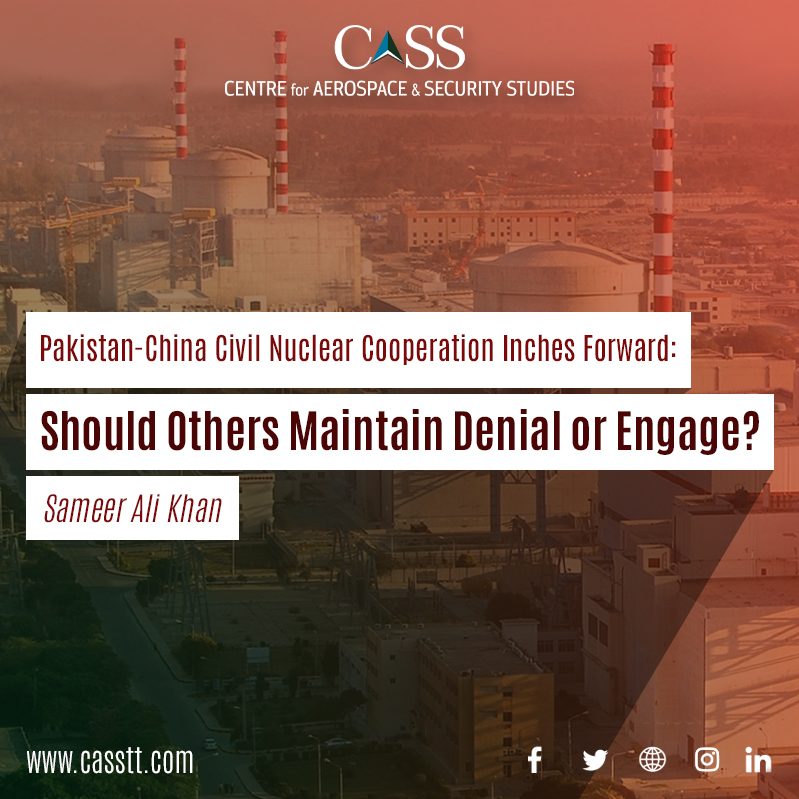On 20th June, Pakistan and China inked a memorandum of understanding (MoU) for construction of a new 1200 Megawatt electric (MWe) Nuclear Power Plant (NPP) at Chashma. Chashma complex already houses four 325MWe NPPs generating about the same amount of electricity – combined – that the new unit will generate alone. With the permanent shutdown of KANUPP-1, all of Pakistan’s six operating NPPs are now Chinese-supplied. In the absence of access to international civil nuclear cooperation, China is likely going to be the only reliable supplier as Pakistan progressively moves toward achieving its Vision 2050 of generating 40,000MW of electricity from NPPs.
This cooperation has, however, faced two-pronged resistance at the domestic and international fronts. At the domestic level, concerns were raised about construction of K-2 and K-3 NPPs in 2013 around nuclear safety, security, and the state of Pakistan’s readiness to manage a potential disaster like Fukushima. In response, relevant organisations (Pakistan Atomic Energy Commission and Pakistan Nuclear Regulatory Authority) worked hard to allay the fears – both genuine and imaginary – and provided clarity into how Pakistan professionally manages its civil nuclear operations. Today, these earlier contested, NPPs contribute invaluable 2,200MWe to the national grid which is not only cheap but also reliable in the sense that it is available round the year. They also contribute positively towards environmental security because of zero carbon emissions and prevent Pakistan from banking on environmentally costly fossil-based energy sources.
At the international level, however, the criticism takes more of a political shape. Some question the legality of this cooperation. They argue that China is violating its obligations under the Nuclear Suppliers Group (NSG) voluntary guidelines. NSG is an informal grouping of nuclear suppliers and its guidelines bar member states from engaging in cooperation with states not implementing full scope International Atomic Energy Agency (IAEA) safeguards. Only the Non-Nuclear Weapon States (NNWSs) implement the full scope IAEA safeguards as part of their requirement under the Nuclear Non-Proliferation Treaty (NPT) while all the Nuclear Weapon States (NWSs) – both the members and non-members of the NPT – voluntarily apply IAEA safeguards on select nuclear facilities.
China argues that the civil nuclear cooperation with Pakistan is grandfathered, i.e., it was initiated before China joined NSG, in 2004, and hence, the restrictions do not apply in this case. Moreover, the Pakistan-China civil nuclear cooperation agreement, signed in 1986, was of indefinite duration and open-ended in the sense that it did not specify the number of reactors to be supplied. While questions over NSG guidelines and Pak-China civil nuclear cooperation re-surface every single time the two states decide to construct a new NPP, similar instances in the region have largely been ignored.
It is worth emphasising that Pak-China civil nuclear cooperation is entirely under the IAEA safeguards and does not contribute towards Pakistan’s military nuclear programme. Pakistani officials rightfully argue against discrimination that is maintained in this domain. Even when India violated its non-proliferation commitments and tested nuclear weapons in 1974, ‘the [US] State Department helped India get around the law by arranging for France and later China to continue the Tarapur fuel supply.’ Likewise, Russia entered into civil nuclear cooperation with India in 1988 as a member of the NSG (admittedly, the requirement for recipient state to have full scope IAEA safeguards was introduced in 1992) and argued that its agreement was grandfathered. However, US officials maintained that even though the agreement pre-dated revised guidelines, ‘no official agreement was signed nor was any money exchanged.’ Therefore, the US did not consider this deal ‘exempt from NSG restrictions.’
The above mentioned US position pre-dates India-specific exceptional NSG waiver. Today, there are no such reservations even as India’s military nuclear programme continues to indirectly benefit from access to foreign supplied nuclear fuel and technology and the applicable IAEA safeguards consolidate the overlaps in its military and civilian nuclear fuel cycles. In the absence of similar overlaps on Pakistani side, it is misleading to even compare the scope and non-proliferation impact of Pakistani and Indian civil nuclear cooperation agreements.
As Pakistan began construction of K-2 and K-3 in 2013, a noted South Asian expert, Toby Dalton, commented that, ‘the Chinese would have a lot of leverage on the price, because there’s no one else that’s willing to sell, or interested in selling, to Pakistan…that gives the Chinese more leverage in the services side of things as well.’ On the flipside, the world is losing out on a significant and progressing nuclear sector in Pakistan by restricting its access to nuclear technologies and materials which will not have any associated proliferation costs. While Pakistan may not be able to get a better price bargain, it gets a reliable supplier of nuclear materials and technology. The other suppliers need to reconsider the costs and benefits of maintaining this denial against Pakistan. Under Vision 2050, Pakistan is likely to be operating approximately 40 NPPs, to generate 40,000MW of electricity. It is now for suppliers to determine if they want to remain disengaged with this potential market.
Sameer Ali Khan is a Senior Research Associate at the Centre for Aerospace & Security Studies (CASS), Islamabad, Pakistan. He can be reached at cass.thinkers@casstt.com




